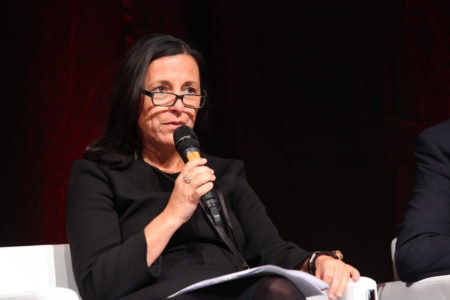Biotechs scramble as public markets dry up, but can private equity help?

The keynote session has become a tradition on the second day of BIO-Europe®, one of the most popular and well-attended events on the conference program. For the past two years, the panel discussion entitled, "A day in the life of experienced dealmakers: Transformational deals that shaped the industry," has easily been able to center on a spate of truly transformational mega-deals. Yet this year that part of the discussion was challenged. Instead, the experienced dealmakers who took to the podium focused on some of the concerns in their daily life as dealmakers, starting with what they agreed is the tail end of the recent boom in initial public offerings (IPOs) for emerging biotechs and freshly made pharma companies.
Evonne Sepsis, Founder and Managing Director of ESC Advisors who invited the panelists hit them early with a rapid series of questions. As the IPO boom slackens from a year ago, she asked, how has this change affected what you are doing, how you are doing it, and the speed with which you can do it?
The VP and Head of Healthcare for Merck Ventures, Jasper Bos, charged ahead with what proved to be a provocative assessment.
 Jasper Bos, Merck Ventures
Jasper Bos, Merck Ventures"The aftermath of the IPO boom for us is purely positive because there remains a strong interest in investing in biotech so that the amount of capital available for doing private deals is actually much higher. Up to 60% of returns on investments continue to come from M&As, not IPOs. Private investment starts to make a lot of sense," he said.
The fact that the IPO market has cooled, he said, is not a significant issue right now.
Constantine Chinoporos, the new Chief Business Officer for the newly created Boston Pharmaceuticals was more measured in saying that while the number of IPOs is down compared to the past two years, it is still high relative to historical numbers.
"Still that leaves a lot of people looking around for financing options," he said, noting that there are approximately 25 IPOs that are stalled at this point.
"For some of them, there is a reason why they are stalled, because the fundamentals have not changed. Investors are looking for differentiated products, good science, and good data. The reality has to meet the promise," he said.
But Claudia Karnbach, Head of Business Development and Licensing for the Specialty Medicine Pharmaceuticals Division at Bayer sees things differently. There has been a contraction of capital, and the situation is not at all that there is enough capital going around for continuing investments.
[caption id="attachment_9452" align="alignleft" width="450"] Claudia Karnbach, Bayer
Claudia Karnbach, Bayer
"We are seeing more companies, potential partners, coming to ask Bayer about an exit instead of licensing," she said. "When I talk to the CEOs of smaller companies or to the venture funds, they actually don't want to share the cost of doing clinical trials, especially in oncology, at the risk of losing a lot of money. They want to get out earlier. For some the IPO market was not favorable and they have had to postpone programs, which means that now the evaluation is not as high."
Lubor Gaal, who is the Head of External Innovation and Licensing for Almirall, agreed that "there is a lack of funding, such that companies are finding themselves forced to sell, or else not able to progress their programs. This is not in our interest, which is seeing companies that have a healthy funding background that allows them to access capital and take their programs further."
Karnbach followed on his comment, adding that, "What we are seeing is that the lack of access to capital is forcing companies to cut corners. We are looking at products that we believe are at a certain stage and are then surprised to see that what we expected is not the reality. Companies cutting corners will find that later on it will have an impact on the valuation of the assets."
Chinoporos took this concern a step further, suggesting that companies cutting corners were further contributing to an industry challenge that the majority of late-stage programs are failing for lack of efficacy.
"The exit at the end of Phase II will be directly translated by the robustness of the data package generated. Phase III should be a confirmatory exercise based on great data," he said, lamenting that this is not the case with 58% of such programs failing.
"This is absolutely crazy. These programs should never have gotten to this point," he said, urging companies to "do the right work, do the biomarkers, find the right patients, do the trial right and invest the capital needed to make it happen. When you cut corners, you are the one who will be shaved. Move too hastily now, and you will regret this later."